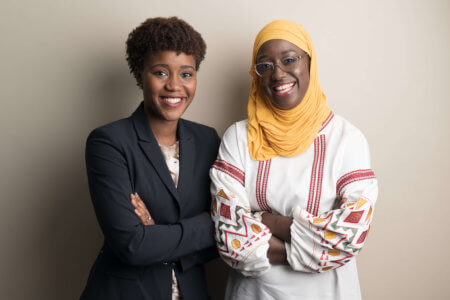
Pro Bono Week 2019 Profile: Maryam Casbarro – Empowering Domestic Violence Survivors
By Sylvia Soltis
Photograph by Elliott O’Donovan
Maryam Casbarro immigrated to the United States from Ghana with her parents when she was a young girl. She recalls how after her family settled in the Bronx, NY, her parents “regularly engaged in community service and were active in their local African immigrant community.” In particular, Maryam recounts how her parents invited several newly immigrated women who were facing domestic violence in their own homes to stay with her family.
“Overhearing the discussions between my mother and these women, I was moved by their experiences,” Maryam said. “Immigrant survivors can feel even more vulnerable being in a new country and often are unaware of the resources available to them. It didn’t matter how well educated or highly regarded these women may have been in their home countries. When experiencing domestic violence, they needed help.”
Maryam’s early exposure to the impact of domestic violence has had a profound impact on her and has guided her pro bono practice as she has forged her professional career. With her parents having set an example to help others, it is no wonder Maryam has volunteered in different capacities throughout her life, including serving as the student director for George Washington University Law School’s internship program at the Domestic Violence Center at the D.C. Superior Court. Now as an associate at Davis Wright Tremaine concentrating in cybersecurity and privacy litigation, Maryam works on a variety of pro bono matters, yet she is particularly drawn to domestic violence and family law matters.
When the Legal Aid Society of the District of Columbia was looking for pro bono counsel for Ms. Fatoumata Niang, Maryam was quick to volunteer and was referred the case through Legal Aid’s Pro Bono Program. Ms. Niang, who is originally from Senegal, sought representation in a divorce case initiated by her physically and emotionally abusive husband. Her husband also was seeking joint physical and legal custody of their eight-month-old baby, as well as child support.
The matter proved to be highly contentious. Mediation was unsuccessful, and the case proceeded to a four-day trial, with the last day scheduled five months after the first three days. During those five months, Maryam’s co-counsel left their firm, and Maryam had a baby and was on parental leave. But Maryam was committed and continued working on the case while on leave so that she could represent Ms. Niang at the final day of trial. When the trial concluded, the judge asked for written closing arguments, which Maryam also prepared during her parental leave.
Ultimately, the judge issued an order granting a divorce and awarding custody and child support on terms that were favorable to Ms. Niang. Her husband filed multiple post-judgment motions to which Maryam responded, but the favorable order was kept in place. Ms. Niang’s husband then proceeded to appeal the trial court decision.
The appeal in Ms. Niang’s case is still pending, but what is certain is that Ms. Niang and Maryam are not the same two people they were at the start of this case. When Maryam initially took on the representation, Ms. Niang was reserved and spoke limited English. Today, Ms. Niang has become fluent in English, is pursuing an education, and has learned to advocate for herself. As a leader in her community, Ms. Niang is developing a guide for domestic violence survivors that lists available services and steps for escaping a violent relationship. Maryam is quick to point out that she takes no credit for the personal growth of her clients, though she does acknowledge that their growth is one of the many things that motivates her to continue her pro bono work. “It’s been an inspiring journey to see how Ms. Niang has persevered,” Maryam said. “She’s a phenomenal woman.”
Maryam’s pro bono practice has not only been personally rewarding – it has also made her a better attorney. She observes that while her cybersecurity and privacy law practice and her pro bono practice may seem quite different, the fundamentals of lawyering are applicable in both areas. As an example, she noted: “Having to explain a legal concept to a client who is not a lawyer and who may not speak English has forced me to be more creative in how I communicate information effectively. Whether it’s a custody case or a cybersecurity matter, I now think differently about how I translate complex legal issues into laymen’s terms.”
In addition, Maryam shares that pro bono work has built up her confidence as an attorney. “My client is depending on me to guide them and come up with good strategies, and it can feel like the stakes are higher in my pro bono cases,” Maryam said. “It’s made me more self-assured in my decision-making.”
Following in the footsteps of her community service minded parents, Maryam has forged a unique path of her own in helping others – one where she empowers her clients and helps them break out of the shadow of their abusers. Maryam does this all while honing her professional skills and growing as an attorney.
Sylvia Soltis is a Staff Attorney in the Pro Bono Program at the Legal Aid Society of the District of Columbia, the oldest and largest general civil legal services program in the District of Columbia. Legal Aid was created in 1932 with the goal of making justice real – in individual and systemic ways – for persons living in poverty in the District of Columbia. For more information about Legal Aid, please visit their website, www.LegalAidDC.org and blog, www.MakingJusticeReal.org.






